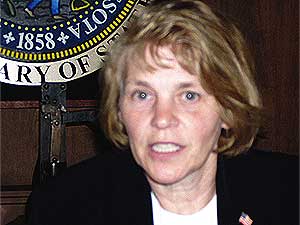Photos
Your Voice
| |||||||||||||||||||||||||||||||||
Local election officials concerned about new voter registration system
June 29, 2004
Minnesota's new voter registration system has its first test Tuesday in a special primary election in Dakota County. The switchover is part of a nationwide overhaul inspired by the Florida debacle of 2000. But some local election officials say a broad rollout of the new system during a tight presidential election could lead to big headaches in Minnesota.
St. Paul, Minn. — Tuesday's election will narrow the field of Republican contenders hoping to replace outgoing State Sen. Dave Knutson, R-Burnsville. Knutson is leaving to become a state district court judge. And as luck would have it, the special primary falls at an awkward time -- less than two weeks after the old voter registry was frozen and the new one powered up. Dakota County Auditor Carol Leonard says election staff have been experimenting with the new system and are confident it will perform as intended.
"Anytime you bring in a new system, you know, there are little things that you learn along the way, little enhancements and things," says Leonard. "That, of course, will be a learning curve for us."
The new system brings Minnesota into compliance with the federal Help America Vote Act, passed in the aftermath of Florida's 2000 election fiasco. Minnesota, generally speaking, was ahead of the curve, having long ago dispensed with butterfly ballots and the like. But there were some technical issues to address in the state's voter registration system.
The issue now is whether the new system will produce reliable voter rosters. If some voters are inadvertently dropped during the changeover -- or if entire rosters are spoiled -- it could create confusion and delay at the polls, perhaps enough to drive some voters away.
|
It's probably not the best idea in the world to be making major changes to complex computer systems four months before the biggest election that we will hold in our four-year election cycle.
- Joe Mansky, Ramsey County elections manager |
Any major new computer system will require some de-bugging, but Secretary of State Mary Kiffmeyer says the transition so far has been reassuringly smooth.
"It's almost anti-climactic," Kiffmeyer says. "It has been incredibly quiet at the help desk -- very minimal number of phone calls or problems or issues. I mean, we just tested it like crazy. We just tested and tested."
Even so, the system isn't complete. Carol Leonard of Dakota County notes that the component that processes and manages absentee ballots isn't ready yet. For a special primary election where turnout languishes at roughly 2 percent, that might not present a problem.
But the demands on the system will be much greater in August, when all 87 counties begin processing absentee ballot requests for September's statewide primaries. And that's just a warmup for the ultimate test on Nov. 2.
"It's probably not the best idea in the world to be making major changes to complex computer systems four months before the biggest election that we will hold in our four-year election cycle," says Joe Mansky, who oversees elections in Ramsey County.
Mansky says that because Minnesota was ahead of most states in complying with the new federal law, it would have taken only minor tinkering to patch up the old system and leave the new one until next year. That would have allowed more time for testing and refining -- and less would be at stake in an off-year election.
Mansky says even if the system performs well under the limited circumstances it's faced so far, it's not fully functioning yet.
"Nor do we know how this system will work when all of the county staff throughout the state are using it simultaneously," Mansky says. "And again, until you adequately test those elements of the system, we're not quite sure exactly what we have."
Mansky and others have complained that Kiffmeyer has been reluctant to ask for, or accept, input from local officials. A separate disagreement over voter registration led Hennepin County Commissioner Randy Johnson to accuse Kiffmeyer's office of an "appalling lack of expertise" in election matters. The federal Justice Department ruled in Hennepin County's favor in that matter.
But Kiffmeyer says she's puzzled by the criticisms -- and she notes that Hennepin, Ramsey, and several other counties participated in a work group to develop the new voter registry.
"It's kind of a situation when you have 87 counties and you take all of their input, reminding me of my children sometimes," says Kiffmeyer. "When they ask for something and I say 'no,' they think I haven't heard them. No, I heard you. It's just that we cannot give you 100 percent of everything you ask for."
The system itself, she says, is what counts. So far, so good. But a collective sigh of relief isn't likely until after November.
|
News Headlines
|
Related Subjects
|


